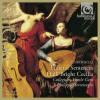Texte paru dans: / Appeared in:
*
GRAMOPHONE (09/1998)
Pour s'abonner /
Subscription information
Harmonia Mundi HMG 508462/63

Reviewer: Jonathan Freeman-Attwood
Herreweghe 's devotion to Purcell was captured memorably when he said, during an interview (8/93), that he would " give the whole of Lully for two bars of Purcell ". At that stage, he had recorded very little Purcell, most notably a coolly received disc of miscellaneous church music in which the dialect of the music seemed strangely remote (Harmonia Mundi, 2/94). If that is a euphemistic way of saying 'not English enough', then that was part of it, though Purcell's discography shows that you do not have to be English to illuminate his expressive world. The two famous St Cecilian Odes reflect a remarkable polarity in the composer's creative priorities: the shorter of the two, Welcome to all the pleasures, is a supreme amalgamation of Fishburn's words and Purcell 's music, bursting with contained subtlety and enchantment. There is also a unique sense of conveying something novel, in this case an inaugural tribute on November 22nd, 1683, to the patron saint of music, henceforth annually celebrating " this divine Science" . Hail, bright Cecilia from 1692 is three times longer and explores all the startling orchestral sounds which changed English music towards something approaching a Handelian palette. It is also truly fin de siècle (some might say Newtonian) in ambition and the imagery is as breathtakingly splendid now as it was when the Victorians first revered it for its boldness and scale.
Such
qualities clearly animate Herreweghe and he shapes this music with a rapture and
precision strangely missing from his recent recording of Bach's Mass in B minor
(Harmonia Mundi , 5/98). This is , for the most part, a compendium of his most
persuasive musical attributes; if there are " two bars of Purcell" which melt
marble then "one perfect harmony" at the close of "Soul of the world" reveals an
intrinsic care in Collegium Vocale's exquisitely conceived vocal line, a
blooming legato where Herreweghe inspires passion from - in homeopathic terms -
the power of the minimum dose. The long opening instrumental music is contained
and noble, juxtaposing light-footed articulation with intimate asides. The whole
is infectiously fresh and never rushed. If not as brilliant or a s full as
McCreesh, Herreweghe is rather more sensitive to the nuances which irradiate
from Purcell 's colouring of words. He largely uses English voices, though the
booklet is unclear who, among the countertenors, actually sings the respective
airs. The beguiling high tenor or Mark Padmore is also confusingly labelled 'A'
for alto . " Hark! hark! each tree" boasts the versatile and effortless alto of
Robin Blaze who, with the assured Peter Harvey, achieves a delightfully
naturalistic lilt. If Parrott's voices are the most universally well suited to
the texts, this new version certainly rivals McCreesh (for whom Peter Harvey
also sings "Wondrous machine" splendidly) for elevated characterization. One
blip here is the piping soprano in "Thou tun'st this world" (Susan Hamilton)
where the voice seems technically and expressively limited. King probably has
the edge in Welcome to all the pleasures, if only for James Bowman's
"Here the deities approve". For beauty of sound , then , Herreweghe is your man.
For dramatic immediacy and excitement , look no further than McCreesh.
Cliquez l'un ou l'autre
bouton pour découvrir bien d'autres critiques de CD
Click either button for many other reviews


